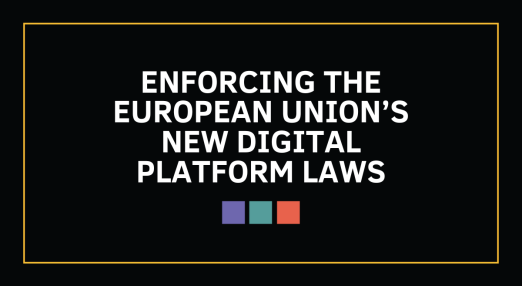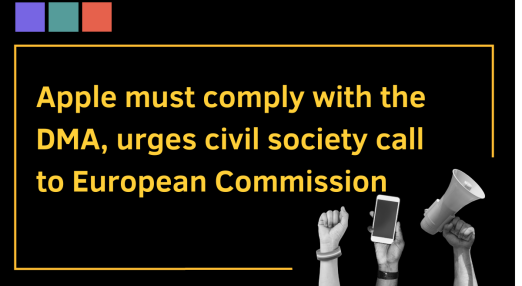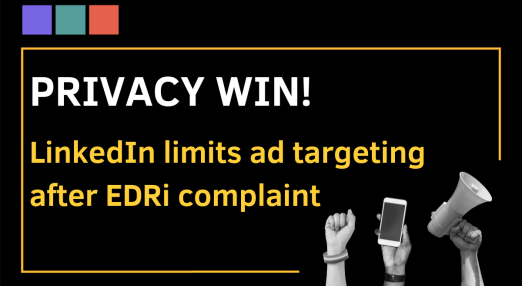Open internet and inclusive technology
New digital technology and the internet brought with it a promise of equal access to knowledge, openness and connection. Their ubiquity has brought opportunity for progress. However, access to digital technology is vastly unevenly distributed. Technology, especially when relying on artificial intelligence, location and biometric data, can amplify social, racial and environmental injustices. We work to bring back the original purpose of an open internet and enable inclusive, sustainable technologies that work for all and for the greater good.
Filter resources
-

Making decision-making just and accountable: A vision for our digital future
Together, we can protect human rights, strengthen democracy, and reshape societal systems. Read about our commitment to making decision-making just and accountable, as part of our Vision for 2024 and beyond.
Read more
-

EDRi-gram, 11 September 2024
With the post-election shake-up and the upcoming appointment of new European Commissioners, both governments and tech giants are making moves that could threaten our rights. In Denmark, efforts to broaden the definition of antisemitism, including criticism of the Israeli state, may lead to the misuse of the Terrorist Content Online Regulation to silence pro-Palestinian voices. In France, legal action against Telegram’s co-founder has intensified calls for stricter enforcement of the Digital Services Act. At the EU level, we’ve seen a troubling decision by the European Commission to cut funding for free software projects. In light of these challenges, and as we prepare for the next EU mandate, we’ve launched a collective strategy process with our members and partners to ensure civil society’s voice is heard in shaping the future of EU digital legislation. On 1 October, over 40 organisations will meet at the Tech and Society Summit to bring our collective vision on the intersection of technology, society, and the environment closer to decision-makers.
Read more
-

Prioritising planet care: A vision for our digital future
Together, we can protect human rights, strengthen democracy, and reshape societal systems. Read about our commitment to empowering people to flourish and thrive, as part of our Vision for 2024 and beyond.
Read more
-

Enforcing the European Union’s new digital platform laws: How it is going so far
It’s already September and the European Parliament’s summer break is officially over. While the legislature was sleeping, the European Union’s (EU) tech enforcers and their counterparts—Big Tech lobbyists—have been busy plotting their next moves. If you have been away over the summer, here is what you might have missed and what that means for the state of digital rights in the EU
Read more
-

European Commission cuts funding support for Free Software projects
The Next Generation Internet initiative has supported Free Software projects with funding and technical assistance since 2018. Despite its proven success, the European Commission made the decision to cut this funding in the current draft for the Horizon Europe 2025 Work Programme. This decision highlights the larger problem of the lack of motivated and sustainable public funding for Free Software projects.
Read more
-

EDRi-gram, 10 July 2024
This is the last edition of EDRi-gram before we take a (well-deserved) break for the summer. Keeping you updated about the various goings-on in the busy world of digital rights is a toilsome task! Don’t worry, this edition is full of interesting news and recommendations for you to follow up on all summer long. You can start by going through a new document pool by the Resist Europol coalition that brings together all relevant resources you’ll need to understand and contest EU’s securitisation agenda, especially through the seemingly never-ending expansion of the bloc’s agency for law enforcement cooperation. With Hungary taking over the presidency of the Council of the European Union as of last week, EDRi and 47 digital rights, human rights & children’s rights organisations have called for the withdrawal of the draft CSA Regulation proposal. It is high time to say good riddance to a proposal that is not only unfit for addressing the complex issue of child sexual abuse, but would also undermine private and safe online communication for all.
Read more
-

Empowering people to flourish and thrive: A vision for our digital future
Together, we can protect human rights, strengthen democracy, and reshape societal systems. Read about our commitment to empowering people to flourish and thrive, as part of our Vision for 2024 and beyond.
Read more
-

Apple must comply with the DMA, urges civil society call to European Commission
Civil society organisations and stakeholders have submitted an analysis to the European Commission about Apple’s attempts to circumvent the Digital Markets Act’s goals of allowing people freedom of choice on their own devices.
Read more
-

EDRi-gram, 26 June 2024
Summer seems to have finally arrived in Brussels, just in time for the heart of the EU to reel from the results of the European elections. Maybe having the sun will make it all bearable? Stay tuned as we test out this theory. We do have some positive news to share from the world of digital rights. Earlier this month, LinkedIn gave in to pressure from civil society and Digital Services Act (DSA) enforcers based on a complaint by EDRi and three partner organisations. The platform will no longer allow advertisers to target ads based on sensitive personal data from users. A big win for privacy! On a similar sunny note, EDRi and the Reclaim Your Face campaign were recently recognised as the Europe AI Policy Leader in Civil Society for our groundbreaking work advocating for a world free from biometric mass surveillance. Do you want to read more about the EDRi network’s impact on defending and advancing digital rights? Our 2023 Annual Report is out now for you to peruse!
Read more
-

EDRi Annual Report 2023: Our collective impact defending digital rights in Europe
In our Annual Report, you can read more about EDRi’s efforts to build an inclusive and equitable digital environment that allows us all to thrive. In 2023, we resisted attempts to normalise corporate and state surveillance, mobilised thousands of supporters, and had an unmistakable impact on European tech policy.
Read more
-

Privacy win: LinkedIn limits ad targeting after EDRi complaint
LinkedIn gave in to pressure from civil society and Digital Services Act (DSA) enforcers based on a complaint by EDRi and three partner organisations. The platform will no longer allow advertisers to target ads based on sensitive personal data from users. That’s a big win for privacy and the DSA, but it also exposes one of the DSA’s more hidden weaknesses.
Read more
-

EDRi-gram, 29 May 2024
What an exciting few weeks we have ahead of us – the European Parliament elections are just around the corner and much is about to change. The next time you read the EDRigram, we will have new decision-makers in place at the Parliament. But before we jump too far ahead into the future, here’s what’s been happening in the digital rights world since we last met. EDRi member La Quadrature du Net is taking legal action against the French prime minister’s decision to block TikTok in New Caledonia. The French government is resorting to the tried-and-tested authoritarian reflexes of obstructing people’s freedom of expression as tensions in the archipelago reach new heights. In this EDRigram, we’re also getting real about EU’s surveillance agenda, and looking at how to enforce the General Data Protection Regulation (GDPR) in a way that realises its full potential.
Read more
